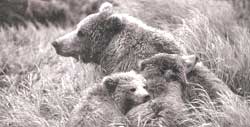Bear business
 RECENT findings of a regional TRAFFIC (a joint programme of the World Wildlife Fund for Nature and the World Conservation Union) has expressed concern that trade in bear organs may continue to place pressure on the declining wild bear population, especially in Asia. East Asia is the centre for the world's demand for bear gall bladders and bile, which are used in traditional medicines for curing liver cancer, haemorrhoids and conjunctivitis.
RECENT findings of a regional TRAFFIC (a joint programme of the World Wildlife Fund for Nature and the World Conservation Union) has expressed concern that trade in bear organs may continue to place pressure on the declining wild bear population, especially in Asia. East Asia is the centre for the world's demand for bear gall bladders and bile, which are used in traditional medicines for curing liver cancer, haemorrhoids and conjunctivitis.
The demand for bear gall bladders and bile as medicine, merits concern in relation to Asia's bear species. The species which might face extinction are the Asiatic black bear and the brown bear populations of Bhutan, China and Mongolia; the sun bear and the sloth bear. Moreover, the increasing demand for bile is having its impact on non-Asian .species like the spectacled bear, American bear and polar bear. Further, the price of bear bile was significantly higher than it was in a 1991 TRAFFIC study in the region which found the trade to be pervasive.
In August 1996, TRAFFIC east Asia conducted a follow-up survey in China, Hong Kong, South Korea and Taiwan and found that the demand in Asia for bear gall bladders and bile remained high. At the same time, the situation differed from country to country, owing to several factors. In China, bear farming is fairly common whereas in Hong Kong, the activity is restricted; there is a tenacity of demand in South Korea, and a moratorium on trade in Taiwan.
A recent issue of TRAFFIC Bulletin (Vol 16, No 3), Cambridge, UK, states that for centuries, bear parts like fat, brain, spinal cord, paws, bide, claws and meat have been used in Traditional Chinese Medicine (TCM). However, the bile stored in the gall bladder of bears is the only bear product commonly found in China's range of medical products today. Significantly, a particular bile acid found in bear bile (ursodeoxycholic acid, or UDSA) has both synthesised and medically proven to be effective in treating numerous human illness, including gallstones, hepatitis and cirrhosis.
It has been reported that approximately 10,000 bears were kept in Chinese farms for bile extraction. Most of them - the Asiatic black bears and the brown bears - were captured from the wild. Bile consumption in China has risen from 500 kg per year in 1990 to about 4,000 kg in 1996. China has encouraged bear farming as a means of taking commercial pressure off the country's wild bear population. Bile from the gall bladders is drained through surgically- implanted devices and sold legally in China's domestic market. Commercially-packaged bear bile is on sale in some of China's international airports where it is clearly marked as bear bile and offered openly for sale in airport shops.
In Hong Kong, while bear gall bladders are still offered for sale illegally, the activity is on the decrease since a government registration system licenses and tags only those bear gall bladders that are proven to be of legal origin.
In South Korea, the people have remained dedicated consumers of bear.- gall bladders as a medicine and health tonic, Farmed bear bile from China is openly available for sale in Seoul. A Bangkok-based Korean tourist guide has estimated that South Korean tourists visiting Thailand (at least 10 per cent of the 360,000 South Koreans who annually visit Thailand), consumed bear meat or bear products during their visit. The tourists reportedly pay from us $7,500 to us $9,000 for live bears, which are killed by drowning. The meat and paws are cooked and consumed at ban- quets. According to the guide, illegal hunting trips are also arranged for South Korean tourists near the borders of Myanmar and China.
In Taiwan, the development of a registration system has been complicated by the local TCM community's experience with Taiwan's rhino registration scheme. Initially, rhino horn registration was to have been followed by a period during which owners could sell off registered stocks. However, international pressure resulted in a complete ban on the use or sale of rhino horn powder. TCM practitioners worry that a similar situation may develop with bear gall bladders.
Related Content
- Rooftop solar development in India: measuring policies and mapping business models.
- Data-Driven Food Systems for Crisis Resiliency
- Global Gender Gap Report 2020
- Draft labelling regulations for packaged food and beverages divide industry
- Free unused mineral land reserved for PSUs, says mining sector
- The global gender gap report 2018
